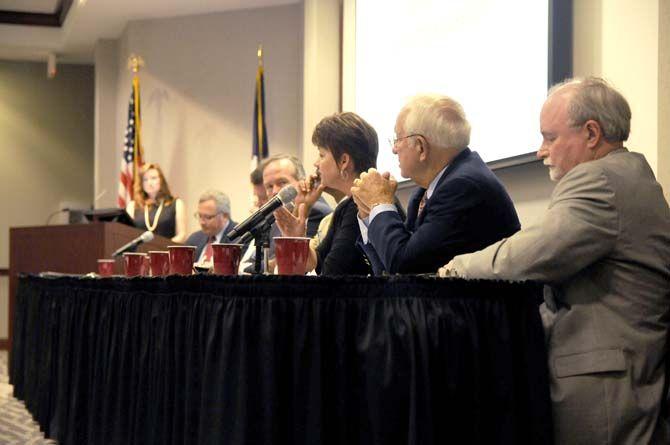The LSU System now has about $14.5 million to support programs for high-demand job fields as its piece of the $40 million WISE Fund, state higher education leaders decided Monday after weeks of meetings.
Tom Guarisco, Louisiana Workforce Commission communications director, said the WISE Fund is part of a larger effort to align higher education with the needs of Louisiana employers, specifically jobs in science, technology, engineering and math fields.
“It is not enough to produce 18,000 graduates,” said University of Louisiana System President Sandra Woodley at a WISE Council meeting. “I think we have to be more strategic about what we’re producing.”
Woodley said the WISE Fund was not about demonizing the arts, but about solving a particular problem and filling in the gaps where people need to fill jobs.
Monty Sullivan, president of the Louisiana Community and Technical Colleges System, said the state has extraordinary demands and limited resources, so it’s important to address its needs regarding filling jobs.
Work on the WISE Fund began more than a year ago to protect higher education from further budget cuts. It aims to allow universities to use their tuitions for academic purposes and focus on education in Louisiana, LSU President F. King Alexander said in August.
The Daily Reveille previously has reported on cuts to the University’s budget for the last several years.
Alexander said after months of work developing plans, the WISE Fund entered the state legislature in March as House Bill 1033 — Gov. Bobby Jindal signed it as Act No. 803 in June.
According to the Office of Budget and Planning’s website, the LSU A&M campus accrued about $652 million in education general expenditures in 2012-2013 — about 16 times more than the entire WISE Fund.
Curt Eysink, executive director of the LWC, said in August the purpose of the leaders coming together was to find a way to spread out the $40 million among public higher education institutions to provide the most “bang for their buck.”
Alexander said this is the first time educational leaders have worked with the LWC. The goal is to get the money to University programs quickly, so by next legislative session, the schools can see results for their actions.
The commission categorizes jobs using a star rating system based on a job’s salary or wages, the number of openings there have been in the past year and the job’s long- and short-term forecasts, Guarisco said.
An economist who can earn a good salary but is not always in demand would receive fewer stars than a computer programmer whose skills are in more consistent demand, said Guarisco.
A three-, four- or five-star job has excellent prospects for the future because it will continue to demand graduates to fill it, and if people are encouraged to pursue those jobs, then the whole state benefits, Guarisco said.
Guarisco said to keep the distribution of the WISE Fund from becoming too bureaucratic, each campus must have a 20 percent private sector match for every dollar of WISE funding they receive.
Alexander said the heads of the systems will be in charge of distributing the funds within their systems because they know their schools’ needs. Alexander wants to support four- and five-star jobs, the ones that will consistently be in demand, over jobs that may only be in demand for a short time.
Louisiana Board of Regents Chairman Clinton Rasberry said the WISE Fund and pairing education with the workforce is unlike anything else. The issue of aligning higher education with the workforce is more complex than anything he ever imagined, he said.
Alexander said when the WISE Fund was first in the works, they were hoping for $120 million, but $40 million more funding is a start.
LSU System receives $14.5 million from WISE Council
September 9, 2014
The WISE panel members met Tuesday August 19th, 2014 at LABI to discuss allocation of funds and implementation of education reform.
More to Discover










